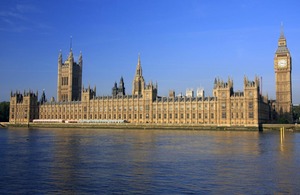Queen's Speech 2013: Local Audit and Accountability Bill
Queen’s Speech bill to save taxpayers up to £1.2 billion and ensure councils deliver value for money.

The Queen’s Speech today (8 May 2013) announced a bill to close the Audit Commission, saving taxpayers up to £1.2 billion, introduce better local auditing of public bodies and increase council accountability to electorate.
At the State Opening of Parliament the government sets out its legislative agenda. It included the Local Audit and Accountability Bill to meet the government’s pledge to reduce the cost of unaccountable quangos on taxpayers and which will help tackle the deficit by ensuring councils make sensible savings.
Commenting on the bill, Communities Secretary Eric Pickles said:
This government is reining in the quango state, saving taxpayers’ money and giving more power to local people. This bill extends the government’s localism agenda - ensuring robust scrutiny of council spending, strengthening the role of direct democracy and protecting an independent free press. That’s what taxpayers want, not Pravda-style propaganda.
The bill will do 3 things to reduce pressure on taxpayers:
- close the Audit Commission and open up auditing to drive down prices; these fee reductions will help council budgets while keeping the same high audit standards and safeguarding public money
- close the Council Tax loophole to prevent unaccountable levying authorities exerting pressure on Council Tax
- enshrine the legal status of the local authority publicity code - stopping unnecessary spending on council newspapers
The government has already abolished the Audit Commission’s expensive inspections and outsourced its audit contracts and the bill will disband the residual Audit Commission and introduce a new local audit framework.
The bill also extends the successful Council Tax referendum provisions introduced in the Localism Act and allows local taxpayers to veto excessive Council Tax rises by unelected local quangos - such as Waste Disposal Authorities, Integrated Transport Authorities, Pension Authorities and Internal Drainage Boards.
The bill will also impose tougher rules to protect the independent free press from unfair competition by town hall newspapers. It strengthens the legal status of the existing Code of recommended practice on local authority publicity, which some councils are currently ignoring. This allows for healthy local democracy with robust scrutiny by an independent local press.
In her address to Parliament, the Queen also announced plans to extend the revitalised Right to Buy, to ensure more tenants can benefit from the increased discounts to buy their council homes.
Currently, tenants need to have lived in council housing for at least 5 years before they can take up the Right to Buy. But under changes in the Deregulation Bill announced today, this will be reduced to 3 years.
Launched in April last year, the reinvigorated Right to Buy offers eligible tenants discounts of up to £75,000 off the value of their home, and up to £100,000 off in London - 3 times the level of discount previously available in some areas.
The government favours localism and is determined to remove unnecessary and burdensome regulation which is why this bill will also repeal redundant centralised legislation including top down targets known as Local Area Agreements and bureaucratic Multi Area Agreements which have been overtaken by city deals.
Further information
A plain English guide to the Local Audit and Accountability Bill describes the main measures of the bill. It is designed to give an overview only. You can read the bill and its explanatory notes in full, and follow its progress through parliament, on the Parliament website.
Savings of up to £1.2 billion from the abolition of the Audit Commission are over a 10 year period and include savings made by local authorities on external audit fees. An impact asssessment quantifies the costs and savings associated with the government’s programme of reforms to local audit set out in the bill.
Media enquiries
Email [email protected]
Please use this number if you are a journalist wishing to speak to Press Office 0303 444 1209